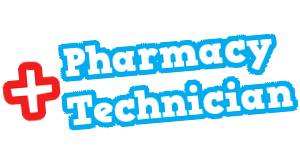Retail vs Hospital Pharmacy Technician: Pay, Duties and Making the Switch
This post contains affiliate links, which earn us a small commission. Learn more by visiting our disclaimer page.
There are many roles for pharmacy technicians (PT) in healthcare. These include: hospital, community (retail), long term care, mail order, specialty, and nuclear pharmacy.
In this article we will break down the work a technician does in a retail setting vs a hospital pharmacy.
Being a pharmacy technician involves reacting to what is happening around you and anticipating the needs of both patients and pharmacists. Regardless of the setting you work in, there are three critical guidelines a technician needs to follow:
1. Anything you do shapes the image of the pharmacy in patient’s eyes.
2. A pharmacist’s licence can be at risk if mistakes happen since they are legally and professionally responsible for your actions.
3. Patient’s live are at risk if mistakes are made from medication errors or Quality Related Events (QREs).
Outpatient pharmacy technician, also known as retail pharmacy technicians work in a retail or community setting.
Retail Pharmacy Technicians
Having worked previously in both retail and other settings, I can tell you that this is where the bulk of pharmacy techs jobs are found. It is also where recent graduates start off in this career.
The state’ laws and rules where a PT works in very much governs the work they do.
Generally though, technicians do not give medical advice to patients or be the final check for drugs and other medication prescriptions (rxs) including compounding of medications unless it’s an independent pharmacy.
Certain states allow technicians to provide information on over the counter drugs (generally non-prescription drugs and medicines such as, antacids and acid reducers, pain relievers, cold and allergy remedies etc.).
Within a retail setting, pharmacy technician’s positions are also wide and varied including: buying technician, general technician, compounding technician, lead technician or billing/insurance technician.
In most retail settings – a general pharmacy technician with some of the above listed skills is the most prevalent.Techs are intimately involved in patient care.
They type rxs, handle incoming and outgoing phone calls, grab drugs of shelves, count or measure the quantify of drugs, and ultimately dispense the medication directly to the patients.
Community pharmacy technicians tasks include but are not limited to:
What does the future hold for retail pharmacy technicians?
Community retail pharmacies is the place to be to get started and get a good rounded experience.
Your days will be fast-paced, interesting and challenging. There are no shortages of retail pharmacy jobs.
While technicians are incredibly busy working in this setting, if you find a retail pharmacy you enjoy working in and are able to grow and expand your knowledge base, a retail pharmacy position can be a positive experience and a stepping stone to a hospital position.
Hospital Pharmacy Technicians
The tasks performed by technicians in a hospital setting take on a different skill set than the skill set required in a community setting.
For example, some technicians may be allowed to compound some medications and add drugs to intravenous solutions using aseptic techniques making certain that the solution remains sterile.
While some compounding may be allowed in some retail pharmacies, this has come under some close scrutiny as of late.
Hospital pharmacy technicians tasks include but are not limited to:
Retail vs. Hospital Pharmacy Technician Salaries
The pay at a community pharmacy is between $9-$10 with no formal training, while those with formal training and certification earn around $13-$15.
According to data from ZipRecruiter as of Oct 28, 2022 retail pharmacy technicians earned:
- an average annual salary of $33,637 or $16.17 per hour
- highest annual salary reached $47,500
- lowest annual salaries paid out $20,000
The top states for retail pharmacy technician jobs are: Georgia, South Carolina, Tennessee and Florida (Fort Lauderdale).
The pay for an inpatient pharmacy technician at a hospital pharmacy comes close to $20/hr so it’s certainly better paid than in a retail setting. In addition, this can increase with certain certifications and there is room for growth.
How Much Do Hospital Pharmacy Technician Jobs Pay per Year?
ZipRecruiter reports the following salaries paid out to pharmacy hospital pharmacy technicians as of Oct 29, 2002.
- Average annual wages $42,329 or $20.35 per hour
- Highest annual salaries go as high as $61,000
- Lowest annual salaries are $28,000
The top states for hospital pharmacy technician jobs are: California, Virginia, Pennsylvania, Georgia, Florida, Texas, New York, New Jersey and Illinois.
How to make the change from Retail to Hospital?
If you’re thinking of making the switch from community retail to hospital pharmacies being IV certified, is a deciding factor. Being flexible is another, hospital work may involve long shifts and early morning hours.
Having completed an institutional pharmacy technician training program.
Lastly, getting certified is another critical deciding factor. It goes without saying that prior pharmacy experience is great to have on your resume.
Ways to get certified?
There are two ways to achieve the CPhD (certified Pharmacy Technician) designation.
Which is better? In short, The PTCE has been around for a lot longer than the ExCPT and thus recognized by more establishments as a basis for a national certification.
As of January 2017, in 24 states, it may be necessary to obtain and maintain active PTCB Certification in addition to registering and becoming licensed with the State Board of Pharmacy.
Study guides to help you pass your certification tests?
Here’s a guide for the best study materials for the PTCB to help you get nationally certified!
Licensure
Finally some states require pharmacy technicians to be licensed by the state they work in. As of April 2015, 45 states register or license pharmacy technicians.
Technicians should contact the Board of Pharmacy in the state they work in to determine which requirements are applicable to them.
